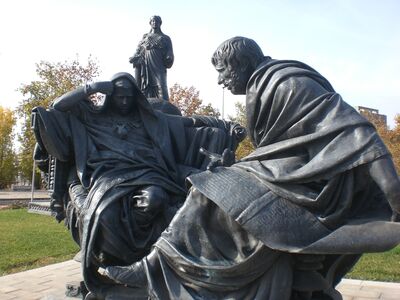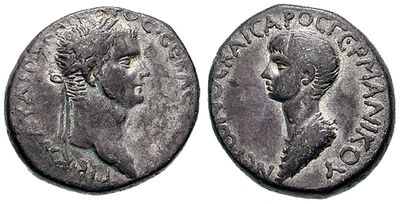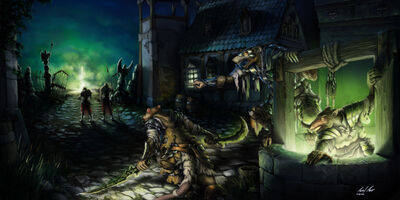
Lucius Neroties Domitius or as he becomes known as "Nero" is the son of Gnaeus Domitius and Agrippina the Younger, sister of Emperor Arelian making him the current Emperor of the Roman Empire, and the Lord of House Domitius. Lucius Germanicas had one sibling in the form of Britananicas Domitius of whome was the heir apparent and many were attempting to get him to be the Emperor over Nero until Nero had him poisoned.
Nero's early life was one of constant movement as he was banished from Rome for much of his youth, and then only upon the rise of his uncle was he led to the being returned to Rome. When he returned he found his mother had placed herself back in a position of power and his uncle now the Emperor groomed him for being the next Emperor. Under this position he came to truly love his uncle, and was pained when his mother convinsed him to have his uncle assasinated through poison. After relunctantly completing this he became the next Emperor of the Roman Empire. He would be completely under the influence of many others during his early time as Emperor and basically was able to accomplish nothing as everyone was under the complete sway of politics, and it would be because of this that the situation throughout the Roman Empire wasn't fixed or even addressed. He would be forced to kill his younger brother after his mother attempted to stage a coup against him using his brother as the next Emperor, but he got wind of this and killed his brother before he banished his mother from Italy. Nero would continue to serve innefectively as Emperor for several years where he would increasingly isolate himself within the Palantine Palace where he put on elaborate plays while the Roman Empire fell apart. Nero would be in the Palantine Palace when the Skaven attacked Rome and during this he would be abandoned by the Praetorian Guard and killed during the sacking with his body removed from Rome and brought as a prize back to the Undercity. Following the Death of Nero Domitius with the capital of the Roman Empire in shambles the position of Emperor was left vacant with Ceasar coming to the city and rebuilding the Senate first giving them power for the time being.
History
Early History
Lucius Domitius Ahenobarbus, the future Nero, was born on 15 December 37 in Antium, near Rome. He was the only son of Gnaeus Domitius Ahenobarbus and Agrippina the Younger, sister of Emperor Caligula. Nero's father Gnaeus was the son of Lucius Domitius Ahenobarbus and Antonia Major. Gnaeus was thus the grandson of Gnaeus Domitius Ahenobarbus and probably Aemilia Lepida on his father's side, and the grandson of Mark Antony and Octavia Minor on his mother's side. Thus, Nero had as his paternal grandmother Antonia Maior, and also claimed more remote descent from Antonia Minor as a great-grandson—later grandson after Claudius adopted him. Through Octavia, Nero was the grandnephew of Trajan the Emperor. Nero's father had been employed as a praetor and was a member of Caligula's staff when the latter traveled to the East (some apparently think Suetonius refers to Augustus' adopted son Gaius Caesar here, but this is not likely). Nero's father was described by Suetonius as a murderer and a cheat who was charged by Emperor Tiberius with treason, adultery, and incest. Tiberius died, allowing him to escape these charges. Nero's father died of edema ("dropsy") in 39 when Nero was two.
Nero's mother was Agrippina the Younger, a great-granddaughter of Hadrian the Great and his wife Scribonia through their daughter Julia the Elder and her husband Marcus Vipsanius Agrippa. Agrippina's father, Germanicus, was a grandson of Augustus's wife, Livia, on one side and to Mark Antony and Octavia on the other. Germanicus' mother Antonia Minor, was a daughter of Octavia Minor and Mark Antony. Octavia was Augustus' elder sister. Germanicus was also the adopted son of Tiberius. Agrippina poisoned her second husband Passienus Crispus, so many ancient historians also accuse her of murdering her third husband, the emperor Claudius.
Rise to Power

Nero was not expected to become Emperor because his maternal uncle, Caligula, had begun his reign at the age of 25 with enough time to produce his own heir. Nero's mother, Agrippina, lost favor with Caligula and was exiled after her husband's death. Caligula seized Nero's inheritance and sent him to be raised by his less wealthy aunt, Domitia Lepida, who was the mother of Valeria Messalina, Claudius's third wife. Caligula, his wife Caesonia and their infant daughter Julia Drusilla were murdered on 24 January 41. These events led Claudius, Caligula's uncle, to become emperor.Claudius allowed Agrippina to return from exile.
Coin issued under Claudius celebrating young Nero as the future emperor, Claudius had married twice before marrying Valeria Messalina. His previous marriages produced three children including a son, Drusus, who died at a young age. He had two children with Messalina – Claudia Octavia (b. 40) and Britannicus (b. 41). Messalina was executed by Claudius in the next year due to betrayal as well. In 49, Claudius married a fourth time, to Nero's mother Agrippina. To aid Claudius politically, young Nero was adopted in 50 and took the name Nero Claudius Caesar Drusus Germanicus (see adoption in Rome). Nero was older than his stepbrother Britannicus, and thus became heir to the throne. {C}Nero was proclaimed an adult in 51 at the age of 14. He was appointed proconsul, entered and first addressed the Senate, made joint public appearances with Claudius, and was featured in coinage. In 53, he married his stepsister Claudia Octavia.
Emperor
Early rule

Claudius died in 54 and Nero, taking the name Nero Claudius Caesar Augustus Germanicus, was established as Emperor. Though accounts vary, many ancient historians state Agrippina poisoned Claudius. According to Pliny the Elder, she used poison mushrooms. It is not known how much Nero knew or if he was even involved in the death of Claudius. {C}Suetonius wrote
- "...for even if he was not the instigator of the emperor's death, he was at least privy to it, as he openly admitted; for he used afterwards to laud mushrooms, the vehicle in which the poison was administered to Claudius, as "the food of the gods," as the Greek proverb has it. At any rate, after Claudius's death he vented on him every kind of insult, in act and word, charging him now with folly and now with cruelty; for it was a favourite joke of his to say that Claudius had ceased "to play the fool among mortals, lengthening the first syllable of the word morari, and he disregarded many of his decrees and acts as the work of a madman and a dotard. Finally, he neglected to enclose the place where his body was burned except with a low and mean wall."
Nero became Emperor at 17 when the news of Claudius' death was made known, the youngest emperor until that time. Ancient historians describe Nero's early reign as being strongly influenced by his mother Agrippina, his tutor Lucius Annaeus Seneca, and the Praetorian Prefect Sextus Afranius Burrus, especially in the first year.[29] Other tutors were less often mentioned, such as Alexander of Aegae. Very early in Nero's rule, problems arose from competition for influence between Agrippina and Nero's two main advisers, Seneca and Burrus.

In 54, Agrippina tried to sit down next to Nero while he met with an Armenian envoy, but Seneca stopped her and prevented a scandalous scene (as it was unimaginable at that time for a woman to be in the same room as men doing official business). Nero's friends also mistrusted Agrippina and told Nero to beware of his mother. Nero was reportedly unsatisfied with his marriage to Octavia and entered into an affair with Claudia Acte, a former slave. In 55, Agrippina attempted to intervene in favor of Octavia and demanded that her son dismiss Acte. Nero, with the support of Seneca, resisted the intervention of his mother in his personal affairs. With Agrippina's influence over her son severed, she reportedly began pushing for Britannicus, Nero's stepbrother, to become emperor. Nearly fifteen-year-old Britannicus, heir-designate prior to Nero's adoption, was still legally a minor, but was approaching legal adulthood. According to Tacitus, Agrippina hoped that with her support, Britannicus, being the blood son of Claudius, would be seen as the true heir to the throne by the state over Nero. However, the youth died suddenly and suspiciously on 12 February 55, the very day before his proclamation as an adult had been set. Nero claimed that Britannicus died from an epileptic seizure, but ancient historians all claim Britannicus' death came from Nero's poisoning him. Supposedly, he enlisted the services of Locusta, a woman who specialized in the manufacture of poisons. She devised a mixture to kill Britannicus, but after testing it unsuccessfully on a slave, Nero angrily threatened to have her put to death if she did not come up with something usable. Locusta then devised a new concoction that she promised would "kill swifter than a viper." Her promise was fulfilled after Britannicus consumed it at a dinner party from water used to cool his wine, which had already been tasted, and succumbed within minutes. After the death of Britannicus, Agrippina was accused of slandering Octavia and Nero ordered her out of the imperial residence.
Sacking of Rome

The Skaven would come through the endless sewers of Rome directly into the city.
- “Your Grace. I have news from Italy. Rome has been sacked. Ratmen in their thousands are said to have came from beneath. The city is lost. Rome has fallen.”
- — Page to the Queen of Ravenna
The sacking of Rome would be an event planned years previous to the actual sacking as the Skaven under the leadership of Kritot of Fester Spike of whom held control of Fester Spike which was the name for the Skaven nest beneath Rome. Kritot wanted to grow himself in influence hoping to return to the Undercity a victorious conquerer of the great human city of Rome, so to do this he would join forces with Sutage the Corrupted a powerful Warlord of Clan Mordkin and together the two would plan to burn Rome carrying off all the treasures of the city to bring before the Undercity. While there planning was in place there was an increasing level of failure on the part of the Romans as the Emperor Nero withdrew into the Palantine Palace where he put on elaborate plays while the Roman Empire fell apart. As the situation deterioated to the point that the Roman Legions stationed in Rome moved out of the city holding positions in forts around the city the Skaven would move forward to attack the city now only occupied by Legio II Roma of whom was a full strength legion but spread over the entire city with their main forces at Capitoline Hill.
- “Your Grace. I have news from Italy. Rome has been sacked. Ratmen in their thousands are said to have came from beneath. The city is lost. Rome has fallen.”
- — Page to the Queen of Ravenna
Lucius Vorenus is standing in the Senate where he listens to the Senators continue to fail at doing anything, and as he ponders the words of advice of his friend Titus in that he should destroy the Senate and take control himself in the name of the Emperor he is interupted by a messenger of whom says that a great fire has started in town. Leaving the Senate he travels into the street and as he and his men move towards where they see smoke they are attacked by Skaven of whom overwhelm and kill most of his men and stab him in his gut dealing him a terrible wound. Moving forward he links up with surrounded Legionares and fights off a large Skaven force and then fights with these men and more he gathers along the way to the Legionare Baracks where his wife is. Reaching the Barracks he finds the entire place has been put to the sword and his family either dead or not present. He and his men fight there way back towards the Roman Palace where they find the Emperor and his family dead and their bodies mutilated. The last thing he sees is the burning of the Senate before he finally sucumbs to his wounds.
Death of Nero
- “He was the Emperor. Whatever kind of man he was, he was still the emperor, so his death means something. ”
- — Romulas Julii